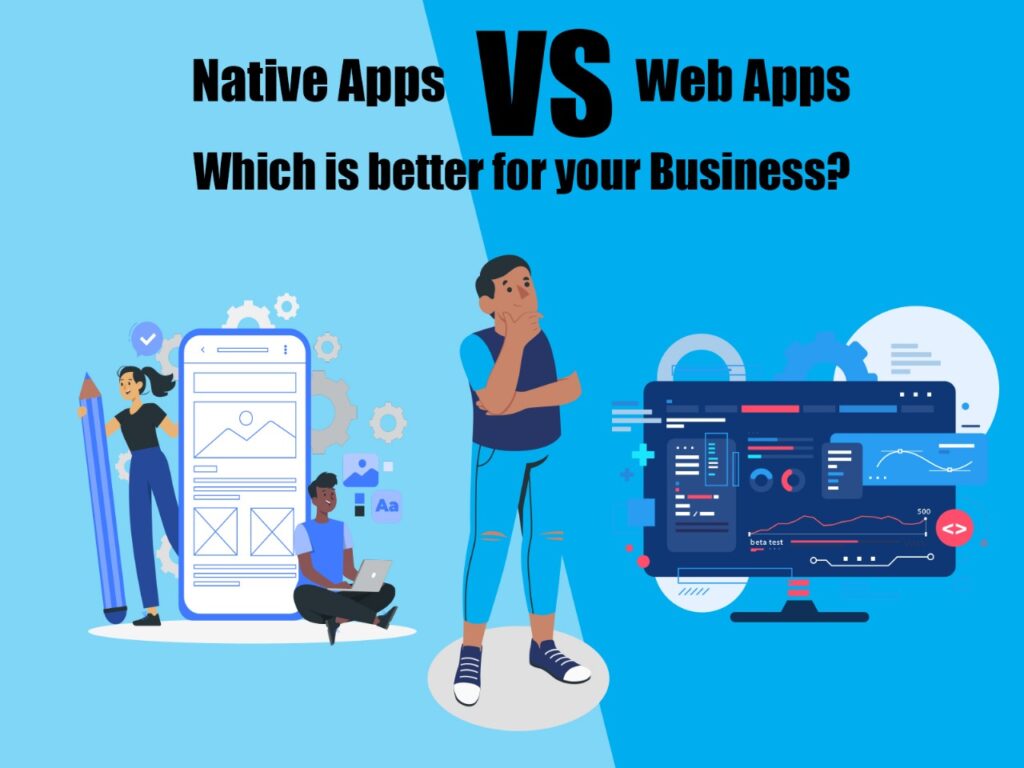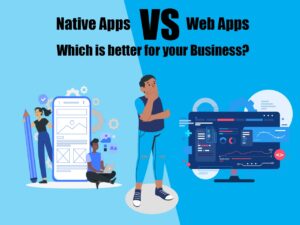Businesses face a crucial decision when it comes to their online presence: should they invest in native apps or web apps? The choice between native apps and web apps is crucial for businesses looking to establish a strong online presence and engage with their target audience effectively.
Selecting the right platform for web development depends on various factors such as the target audience, budget, functionality requirements, and maintenance needs. Understanding the differences between these two options and their respective advantages and disadvantages is essential for making an informed choice that aligns with business goals.
Native Apps
Native apps are built specifically for a particular operating system and are optimized to deliver the best performance and user experience on that platform. Native apps are developed for a specific platform, such as iOS or Android, using programming languages like Swift or Java. They are downloaded and installed directly onto a user’s device from app stores. Native apps are ideal for applications that require high performance, access to device hardware, and offline functionality, such as games, multimedia apps, and productivity tools.
Developing native apps can be costly and time-consuming, as separate versions need to be built for each platform, and ongoing maintenance and updates are required to ensure compatibility with new devices and operating system versions.
Advantages:
- Superior performance: Native apps offer faster loading times and smoother navigation compared to web apps.
- Access to device features: They can leverage the full capabilities of a device, such as camera, GPS, and push notifications.
- Offline functionality: Native apps can provide functionality even when the user is offline, enhancing user engagement.
Disadvantages:
- Cost of development: Building native apps requires separate development teams for each platform, leading to higher development costs.
- Maintenance: Updates and bug fixes need to be implemented separately for each platform, increasing maintenance overhead.
- Platform dependence: Separate versions need to be developed for different platforms, leading to fragmented development efforts.
Web Apps:
Web apps are platform-independent and can run on any device with a compatible web browser, making them highly accessible. Web apps, on the other hand, are accessed through a web browser and do not need to be downloaded or installed from an app store. They are developed using web technologies like HTML, CSS, and JavaScript. Web apps are well-suited for applications that require broad accessibility, easy updates, and cross-platform compatibility, such as content-based websites, e-commerce platforms, and collaboration tools.
However, they may suffer from performance limitations compared to native apps, especially for resource-intensive tasks such as gaming or multimedia playback. Web apps have limited access to device features and may require an internet connection to function, which can be a disadvantage in offline environments.
Advantages:
- Cross-platform compatibility: Web apps can be accessed on any device with a web browser, eliminating the need for separate development efforts for different platforms.
- Easier updates: Updates to web apps can be deployed instantly to all users without the need for app store approval.
- Lower development cost: Developing a single web app for multiple platforms is generally more cost-effective than building separate native apps.
Disadvantages:
- Performance limitations: Web apps may suffer from slower loading times and less responsive user interfaces compared to native apps.
- Limited access to device features: They have restricted access to device hardware and software capabilities, limiting their functionality.
- Dependency on Internet connection: Web apps require an Internet connection to function, which can be a limitation in offline environments.
Comparing Native apps and Web apps
Below is a comprehensive difference table comparing native apps and web apps across various aspects:
| Aspect | Native Apps | Web Apps |
| Development Language | Platform-specific languages (e.g., Swift, Java, Kotlin) | Web technologies (HTML, CSS, JavaScript) |
| Installation | Downloaded and installed from app stores | Accessed through a web browser |
| Platform Dependency | Platform-specific (iOS, Android) | Cross-platform (runs on any device/browser) |
| Performance | Generally faster and smoother | May suffer from slower loading times |
| Access to Features | Full access to device hardware and OS features | Limited access to device features |
| Offline Functionality | Can work offline with locally stored data | Limited offline functionality |
| Updates | Separate updates for each platform | Instant updates across all platforms |
| Maintenance | Higher maintenance overhead | Easier maintenance with centralized updates |
| Cost | Higher development costs | Lower development costs |
| Accessibility | Platform-specific | Cross-platform |
| User Experience | Highly optimized for specific platform | May lack platform-specific optimizations |
| Flexibility | Limited flexibility due to platform constraints | Greater flexibility with web technologies |
| Examples | Games, multimedia apps, productivity tools | Content-based websites, e-commerce platforms |
Factors to Consider Between Native App and Web App
When deciding between native apps and web apps for business, consider the following factors:
- Target audience: Analyse the preferences and behavior of the target audience to determine which platform would best serve their needs in Digital Marketing.
- Budget: Evaluate budget constraints and weigh the cost of development and maintenance for each option.
- Functionality requirements: Consider the features and functionalities of the SEO app and assess whether they can be effectively implemented as a native or web app.
- Maintenance and updates: Factor in the ongoing maintenance and update process for each platform and assess the ability to manage it effectively.
Conclusion:
Choosing between native apps and web apps is a critical decision that can significantly impact business’s success in the digital landscape. Understanding the advantages and disadvantages of each option and considering key factors such as target audience, budget, functionality requirements, Quality Content, and maintenance needs, can make an informed choice that aligns with business goals and objectives.
Whether native apps or web apps are better for business depends on circumstances and priorities. Looking for Web application or mobile application services contact Techrynok for all your needs!





